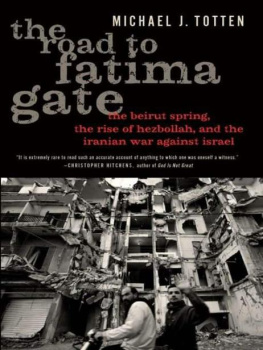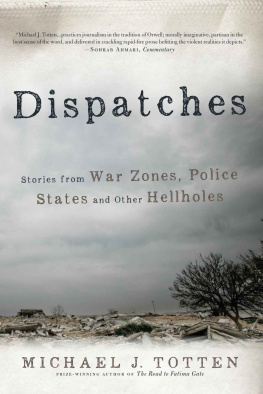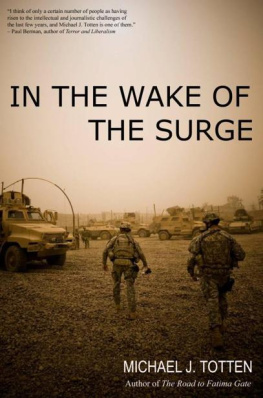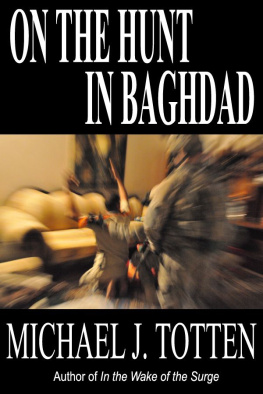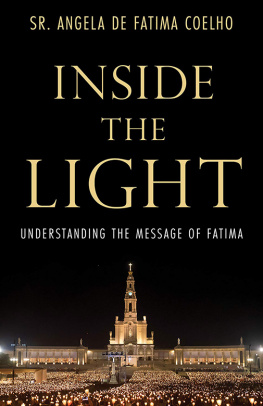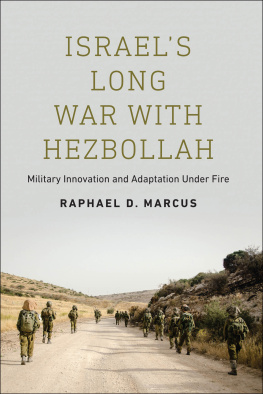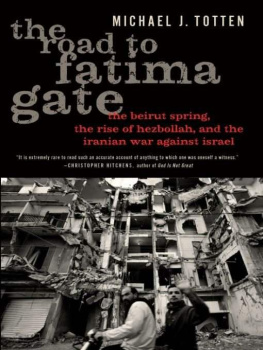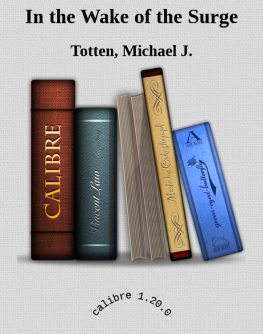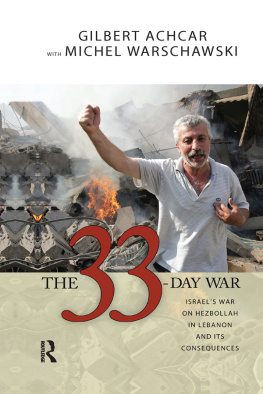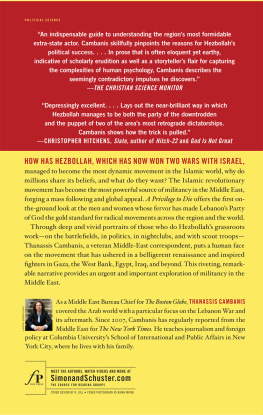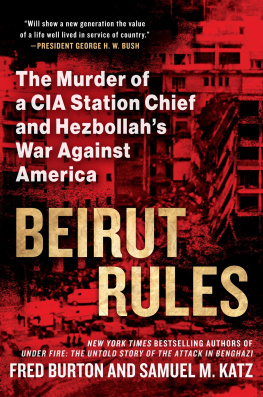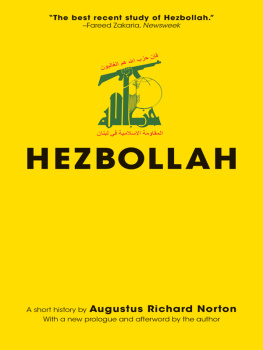Table of Contents
for Shelly
INTRODUCTION
the beirut spring
We dont want the great Syrian prison.
KAMAL JUMBLATT
Rafik Hariri is the person who made Lebanon into a nice place from a place that had nothing nice in it.
LEBANESE SCHOOLCHILD
O n February 14, 2005, an unseen assassin in downtown Beirut activated the detonator on an improvised explosive device and turned former Lebanese Prime Minister Rafik Hariris motorcade into a fireball. The blast ripped apart vehicles and ignited their gas tanks, shattered buildings in every direction, blew out the windows of the refurbished Phoenicia InterContinental Hotel, and left a crater in the street deep enough to swallow a house. The concussion wave shook foundations everywhere in the capital, and the sound echoed off the sides of the mountains.
Hariris armor-plated Mercedes could shield him from sniper rounds and fragmentation grenades, but it could not protect him from this. His family could at least rest knowing that he died instantly. Bassel Fleihan, Lebanons former minister of economy and trade, suffered burns on more than 95 percent of his body and would not succumb to his wounds until two months later. Twenty others, mostly bodyguards, also were killed, and more than 200 innocent bystanders were injured.
The scene was a horror. Not only was the former prime minister almost certainly dead, but the whole street was on fire and hundreds of burned and bleeding people were screaming. Acrid black smoke boiled from the vehicles, making rescue all but impossible.
It was an act of war and an act of political terrorism, and almost everyone suspected at once that the Syrian government did it.
Syria all but annexed the country at the end of the Lebanese civil war fifteen years earlier, and opposition to rule from Damascus had been rising at home and abroad. Hariri wasnt exactly the front man for that movement, but he was by far the most popular Lebanese leader who had tired of Pax Syriana. Syrias strongman President Bashar al-Assad rightly saw Hariri as a threat and wrongly gambled that he could shore up his own rule by dispatching the former prime minister downtown in broad daylight.
It didnt work. Lebanon exploded in revolt the likes of which the modern Middle East had never seen. About a million people in a country of just more than four million descended on Martyrs Square in Beirut and demanded the immediate termination of Syrias military occupation and the banishment of its mukhabarat intelligence agents. Hundreds of young people set up a tent city downtown and refused to go home until the Syrian soldiers were out and free elections were formally scheduled.
The story captivated the world. It seemed the color revolutions that had recently toppled authoritarian regimes in the former Soviet Unionthe Rose Revolution against Eduard Shevardnadze in Georgia, and the Orange Revolution against Viktor Yanukovychs electoral fraud in Ukrainefound their echo in, of all places, an Arabic-speaking country.
Bashar al-Assad and his ruthless late father, Hafez al-Assad, swore their occupation of Lebanon was a benevolent mission on the part of the forces of order. Somebody had to step in and keep the countrys factions from killing each other. Most of the world accepted this for a while. Many Lebanese even accepted this at first. Lebanon had dismembered and all but destroyed itself between 1975 and 1990, and it didnt let up until Syria conquered the country, brokered the Taif Agreement, and disarmed the combatants. If Syria left, the hotheaded Lebanese might take their M16s out of their closets again.
Thats what al-Assads people said, anyway. As if right on schedule, the uprising against Syrian rule had barely even begun when a series of car bombs exploded from East Beirut to the port city of Jounieh.
I hopped a midnight flight to Beirut from Germany just after the fourth bomb went off. Never before had I flown on so empty a plane. Even my flight to New York City two weeks after al Qaeda destroyed the World Trade Center had more people on it.
Hardly anyone wanted to fly to Beirut now that Beirut was Beirut again. Just about everyone in the world my age or older remembered vividly when the city epitomized urban disaster zones in the 1980s. The very name of the city had made me shudder for most of my life, conjuring images of vicious communal bloodletting; airplane hijackings; smoldering embassies; suicide bombers; and hostage-takers with their AK-47s, crazed manifestos, and ski masks.
I am going to die here, one of my colleagues said to himself as his own flight prepared to land.
I stayed in a hotel on the west side of the city that was almost as empty as the plane I flew in on. Management discounted the rack rate so steeply that my stay was practically free. The only other guest on my floor was a big shot from some other place whose twitchy bodyguards staking out the hallway started every time they saw me coming.
Most high-end hotels hired security guards to search every car that pulled up for explosives. It didnt matter who you were, where you were from, or what you looked likeyou could not park out front without first having your trunk and undercarriage searched by men wielding mirrors, flashlights, and rifles. I could forget about ordering a pizza. A sign taped to the elevator door in the lobby said, Due to the security situation we no longer allow food deliveries from outside the hotel. Thank you for understanding.
It wasnt as nerve-wracking as it sounds. The streets were quieter than usual, but otherwise, life continued as normal. I couldnt help wondering, though, as I tried to sleep my first night, if the building was about to explode.
My hotel didnt explode, but I did tread a bit gingerly when I went downtown and met with the dissidents in their tent city. Who could say for sure that Syria wouldnt just open fire and kill hundreds of people as Chinas Deng Xiaoping did in Beijings Tiananmen Square in 1989? The late father of the current Syrian president killed as many as tens of thousands in one weekend alone when the Muslim Brotherhood took up arms against his government. No one is safe, activist Jad Ghostine told me. If they will kill the prime minister, they will kill anyone.
Thomas Friedman, the veteran journalist who cut his teeth in Beirut during the war, issued a stark warning in the New York Times . There will be no velvet revolutions in this part of the world, he wrote. The walls of autocracy will not collapse with just one good push. As the head-chopping insurgents in Iraq, the suicide bombers in Saudi Arabia and the murderers of Mr. Hariri have all signaled: The old order in this part of the world will not go quietly into this good night. You put a flower in the barrel of their gun and theyll blow your hand and your head right off.
Beirut, as it turned out, actually did get a velvet revolution of sorts, but no one knew at the time thats what would happen. Those who knew Lebanons history, as Friedman did better than most, had plenty of reasons to worry.
Clashes between Palestinian and Christian militias in 1975 unleashed fifteen years of sectarian warfare unprecedented in its ferocity in the Middle East since the dissolution of the Ottoman Empire. It was all the more tragic that it happened in the most liberal and democratic of the Arabic-speaking countries.
All Middle Eastern countries have religious minorities, but Lebanon is the only one without a religious majority. A little more than a third of the population is Christian, a little less than a third is Sunni Muslim, and a final third or so is Shia Muslim. Druze make up roughly 5 percent.


